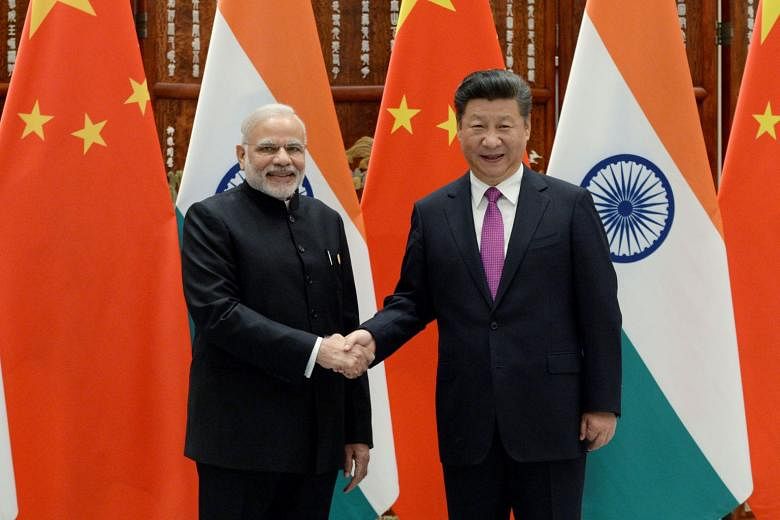India has signed an agreement to step up defence collaboration with Rwanda, and has extended US$200 million (S$273 million) in credit for the country's infrastructure development during a visit by Prime Minister Narendra Modi.
Mr Modi, who is on a five-day tour of Rwanda, Uganda and South Africa, also donated 200 cows to villagers, in support of Rwandan President Paul Kagame's pledge to eradicate poverty.
The Indian leader arrived in Kigali on Monday, just after Chinese President Xi Jinping, who is also on a tour of Africa, departed. Both men are attending a meeting of the Brics nations - namely Brazil, Russia, India, China and South Africa - today.
Analysts said Mr Modi's visit was an important part of India's outreach to Africa.
India has offered a US$100 million line of credit for development of industrial parks and another US$100 million for agriculture irrigation schemes. It will also engage in capacity-building programmes for Rwanda's military through the defence agreement.
"We hope to take ties between the two countries to a higher plane," said the Indian premier at a joint press briefing with Mr Kagame, at which Mr Modi also announced that India would be setting up a high commission in Rwanda.
According to reports, China and Rwanda signed multiple agreements related to the Belt and Road Initiative (BRI).
While it has wooed Africa, a growing market for Indian goods and investments, for some time, India has not been able to match China's rapid growth on the continent.
Also, in contrast with China's hard-nosed investment and infrastructure push, India's outreach to Africa often takes the form of funding developmental and capacity-building programmes. For the South Asian giant, whose economy is poised to grow at over 7 per cent, Africa presents a strategic and economic opportunity.
"The visit of the Prime Minister to these three countries is a reflection of the intensity of our engagement with Africa and the priority we attach to our relations with African countries," said Mr T. S. Tirumurti, secretary in charge of economic relations at India's Ministry of External Affairs, during a recent briefing on Mr Modi's visit.
"As regards China, I don't think we see ourselves in a competition in Africa at all."
He said India's relations with African countries go back many years, and now stand on a very "solid foundation of development cooperation and security and other cooperation which is enlarging".
Bilateral trade between Africa and India stood at US$52 billion for March 2016-17, with India mainly exporting raw materials while also selling items such as automobiles. Meanwhile, trade between China and Africa stood at around US$220 billion in 2014.
China has also been boosting its defence cooperation with Africa, in what is seen widely as an attempt to secure its strategic interests and also push its One Belt One Road initiative or BRI. Last year, China opened its first overseas military base in Djibouti, on the edge of the Indian Ocean, and this year it opened a military training centre in Tanzania for Tanzanian troops.
Analysts said security and defence cooperation was also emerging as an important area for India.
New Delhi's Indo-Pacific strategy, which seeks to increase its influence, extends from the Indian Ocean to the Pacific Ocean, with eastern Africa forming an important component embodying, among other things, freedom of navigation.
"Africa is important for various reasons, in terms of market resources, the (Indian) diaspora and maritime. Defence cooperation has not been intense, but we are trying to focus on that area.
"The eastern part of Africa (for instance) is important for India's Indo-Pacific vision. It is part of an extremely important maritime neighbourhood and is critical to India's security," said research fellow Nivedita Ray at the New Delhi-based Indian Council of World Affairs.
"Africa remains of the highest priority in India's foreign policy."

